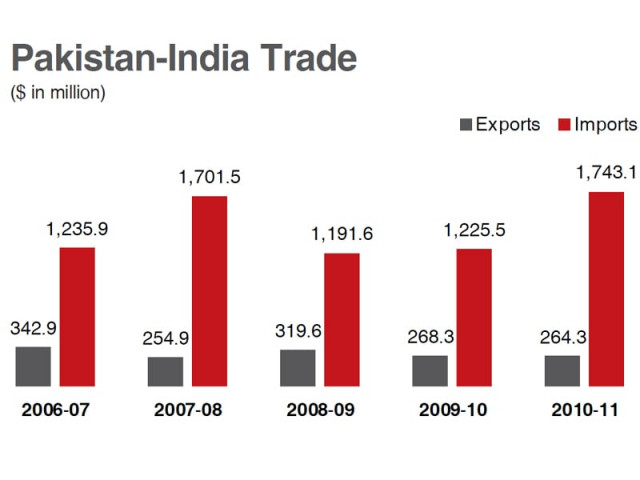MFN status– first step towards trade integration
Most Pakistanis approve of it, the only problem is finding the perfect time.

Until recently, the government was negotiating with the farmers’ lobby to end their opposition regarding MFN.
Pakistan missed the December 31, 2012 deadline for giving the MFN status to India. Then, the present government decided to finalise the entire necessary framework by January 15, 2013 but was yet to come up with something concrete.
A week ago, Minister of State for Commerce Senator Abbas Khan Afridi told the Senate that Islamabad will give MFN to India next month, February 2013. “We want the credit [of granting MFN status to India]. We are heading towards the final stage now. MFN status will be awarded to India by prioritising state interests, taking all stakeholders on board in Pakistan.” said Afridi.
Afridi’s comment on ‘taking the credit’ on MFN was interesting because there was a general impression that government was bowing down to the pressure of some business lobbies and hardliners who were opposing the move.
With little time remaining as elections draw closer, the question is ‘what will be the next government’s view regarding the trade liberalisation process with India?’
Pakistan Muslim League Nawaz (PML-N) – the main opposition party in Pakistan and likely a dominant player in the post-election scenario of 2013 – has considerable weight as far as liberal trade with India is concerned.
Talking to The Express Tribune, PML-N Deputy General Secretary Ahsan Iqbal said, “We think that both countries should promote regional trade and move forward on all fronts including trade and commerce.”
Pakistan and India should normalise their relations on the lines of the ‘Lahore Peace Process’ that the two countries agreed upon in the late nineties.
Until recently, the government was negotiating with the farmers’ lobby to end their opposition regarding MFN. The farmers’ lobby believe that products of the heavily-subsidised Indian agricultural sector will adversely affect them.
Asad Umer, senior vice president and the man behind the economic policy of Pakistan Tehreek-e-Insaf, told The Express Tribune that his party was advocating holistic economic policy with India.“PTI has no ideological opposition with MFN and trade with India.”
“We want to see things moving forward in the right direction where both countries benefit from trade and commerce,” Umer added.
A top-level Indian bureaucrat, who was visiting Pakistan, told The Express Tribune that India was serious in removing all hurdles in bilateral trade including all NTBs but it will take some time.
“Delhi is trying to increase the speed of implementation of important decisions that the two countries are taking on bilateral trade,” he said. “We are trying to shift decision-making powers from the capital city to the border region so that things move fast instead of facing bureaucratic delays in Delhi.”
Leading textile firms of Pakistan want to do business in India but they were hesitant to take any step owing to the uncertainty at the political front especially after the recent tensions on the line of control (LoC). Many think that such setbacks were the biggest nuisance why both nations prefer a wait-and-see policy.
“Though MFN got a temporary setback, it is delayed but not over,” Pakistan Business Council (PBC) Chief Executive Kamran Y Mirza, an association of leading national and multinationals that brought all the political parties on a single platform to reach a consensus on liberal trade with India.
Published in The Express Tribune, February 4th, 2013.
Like Business on Facebook to stay informed and join in the conversation.



















COMMENTS
Comments are moderated and generally will be posted if they are on-topic and not abusive.
For more information, please see our Comments FAQ